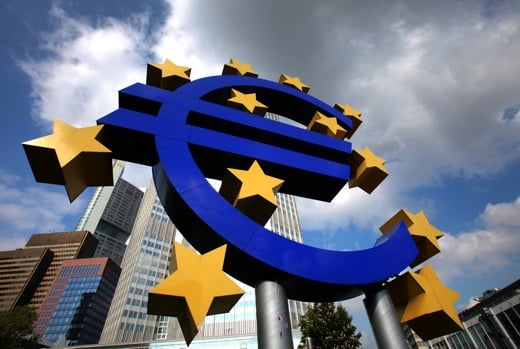Officials in Europe act swiftly to protect banks; 'false market rumors'
France, Spain, Italy and Belgium imposed bans on short-selling to stabilize markets after European banks including Societe Generale SA hit their lowest level since the credit crisis.
“While short-selling can be a valid trading strategy, when used in combination with spreading false market rumors this is clearly abusive,” the European Securities and Markets Authority, which coordinates the work of national regulators in the 27-nation European Union, said in a statement after talks ended late yesterday. National regulators will impose the bans “to restrict the benefits that can be achieved from spreading false rumors or to achieve a regulatory level playing field.”
The watchdogs are trying to stem a rout that sent European bank stocks to their lowest in almost 2 1/2 years and quell concern that European lenders may be struggling to fund themselves. Banks' overnight borrowings from the European Central Bank jumped to the highest in three months yesterday, a sign some lenders may have need for emergency cash. Regulators imposed similar limits on short sales in September 2008 following the collapse of Lehman Brothers Holdings Inc.
The move “shows a sense of panic among European regulators,” Giri Cherukuri, head trader for Oakbrook Investments, which manages $2.7 billion, said in a telephone interview. “On the other hand, people have been calling for regulators to do something decisive, and this is one step along that way.”
Bank Index
The Bloomberg Europe Banks and Financial Services Index, which is down 25 percent this year, rose 2.8 percent at 10:42 a.m. in London.
Market turbulence has already led Turkey to curb short sales and threaten “severe” penalties for manipulation, following nations including Greece and South Korea. Britain, the first to impose a temporary ban in September 2008, lifted its restrictions in January 2009. The Financial Services Authority said yesterday it has no plans to reintroduce a ban.
Short-sellers sell borrowed shares with plans to buy them back later at a lower price, a practice politicians and some investors blame for roiling markets.
“EU policy makers don't seem to understand the law of unintended consequences,” Jim Chanos, the short seller known for predicting Enron Corp.'s collapse, said by e-mail. “The vast majority of short-selling financial shares is by other financial institutions, hedging their counterparty risks, not speculators. The interbank lending market froze up completely in October to December 2008 -- after the short-selling bans.”
Overnight Lending
France's markets regulator said in a statement it will ban the creation of any net short positions and any increase in such positions for at least the next 15 days. The 11 companies covered by the restrictions include insurer Axa SA (CS), BNP Paribas (BNP) SA, Credit Agricole SA (ACA), Natixis and Societe Generale, the regulator said. Market makers will be exempt from the ban.
In Belgium, the local regulator said it banned short- selling “by any means whatsoever.” Existing short positions won't be banned, though they can't be increased. Ageas (AGS), Dexia SA (DEXB), KBC Groep NV (KBC) and KBC Ancora (KBCA) are covered by the limits.
Italian Regulator
The board of Italy's securities markets regulator, Consob, postponed a meeting to before the market opens today, said an official at the Rome-based watchdog, who couldn't be identified in line with its policy. The meeting will address short sales and measures to review the practice, the official said.
Florence Harmon, a spokeswoman for the U.S. Securities and Exchange Commission, declined to comment on the EU measures.
Steven Maijoor, ESMA's chairman, said the agency responded to “rumors,” specifically about France.
“In past days, in some countries we have seen very volatile trading and also rumors,” Maijoor said in an interview with Bloomberg Television. “That was the reason to get together as ESMA and coordinate measures in four countries.”
Frederic Oudea, chief executive officer of Paris-based Societe Generale, defended the company against speculation that a deterioration in France's creditworthiness would damage the bank's stability. He called the rumors “absolute rubbish” in an Aug. 10 interview with CNBC after the stock sank 15 percent.
Royal Bank Report
Oudea's bank is among lenders being targeted by investors because of its perceived dependence on short-term funding, according to analysts at Royal Bank of Scotland Group Plc.
“The primary culprit for the share-price decline is funding concerns for European banks in general and French banks in particular,” RBS analysts including Stefan Stalmann said in a note to clients yesterday. “The mix of euro doubts and rating fears in recent days and weeks may have dented the confidence of funding counterparties, which has then fed back into equity markets.”
Societe Generale, Credit Agricole, Spain's Bankia SA, Italy's UniCredit SpA (UCG) and Intesa Sanpaolo SpA (ISP) as well as Germany's Commerzbank AG (CBK) are among banks with the lowest net stable funding ratios and are most reliant on short-term sources of wholesale funding, RBS said. Societe Generale said on Aug. 10 it had fulfilled “almost all” of its funding plan for 2011.
--Bloomberg News--







